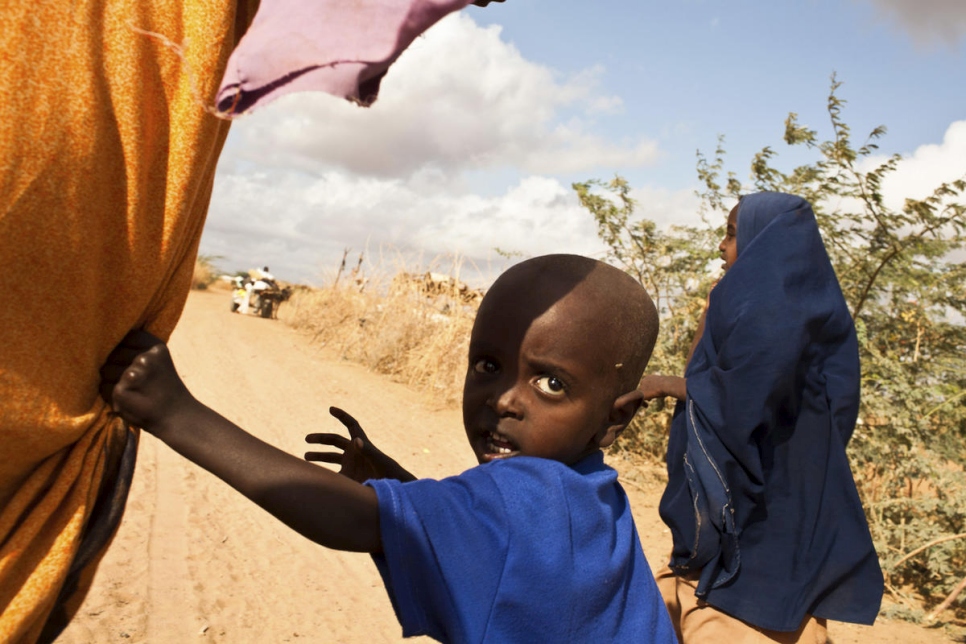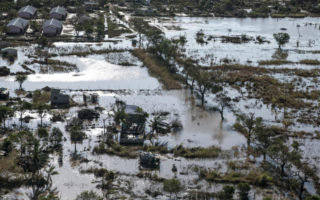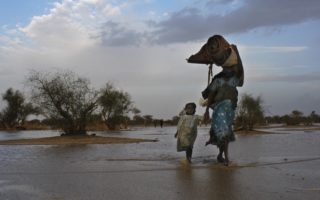
Kenya / Somali refugees / A mother and her two children follow a donkey cart packed with the family’s possessions relocate to Ifo extension from a self-settled area of Ifo camp in Dadaab, Kenya. The camp has seen an influx of close to 40,000 new refugees from Somalia since June, 2011. It is the largest refugee camp in the world. They are part of a recent exodus from Somalia due to continued civil war and the consequences of drought and famine./ UNHCR / B. Bannon / July 2011 © UNHCR/Brendan Bannon
UNHCR, the UN Refugee Agency, welcomes this week’s ruling of the UN Human Rights Committee in the case of Teitiota v. New Zealand.
While the claim to protection by Mr. Teitiota was denied on grounds that he was not at imminent risk, the committee nonetheless determined that people who flee the effects of climate change and natural disasters should not be returned to their country of origin if essential human rights would be at risk on return.
This is a landmark decision with potentially far-reaching implications for the international protection of displaced people in the context of climate change and disasters. It also underscores the importance of countries taking action to prevent or mitigate against harms associated with climate change, which in future could otherwise force people to leave, triggering international obligations.
The following is a more detailed UNHCR assessment of this ruling:
UNHCR has consistently stressed that people fleeing adverse effects of climate change and the impact of sudden and slow-onset disasters may have valid claims for refugee status under the 1951 Refugee Convention or regional refugee frameworks. This includes but is not limited to situations where climate change and disasters are intertwined with conflict and violence. The Committee’s decision supports this interpretation of existing protection frameworks. It recognises that international refugee law is applicable in the context of climate change and disaster displacement.
Climate change and the impact of disasters resulting from natural hazards can have multiple effects on countries, communities, the well-being of individuals and their ability to enjoy and exercise their rights. This has consequences for the application of the 1951 Convention and regional refugee frameworks such as the OAU Convention and the Cartagena Declaration.
The Committee’s decision elaborates on the specific human rights which may be violated in the context of the adverse effects of climate change and the impact of disasters, including the right to life. The ruling notes that sudden-onset events and slow-onset processes can propel cross-border movement of individuals seeking protection from life-threatening risks.
UNHCR highlights the Committee’s finding that where such risks are imminent, it may be unlawful under the International Covenant on Civil and Political Rights (ICCPR) for governments to send people back to countries where the effect of climate change exposes them to life-threatening risks (article 6) or where they are at real risk of facing cruel, inhuman or degrading treatment (article 7 of ICCPR). The Covenant covers a broad range of civil and political rights that also apply to asylum-seekers and refugees. These include among others the right to life (article 6) and the right not be subjected to torture or to cruel, inhuman or degrading treatment or punishment (article 7).
The Committee importantly refers to the need for robust national and international efforts to avoid exposure of individuals to violations of their rights due to the effects of climate change. It warns that the risk of an entire country becoming submerged by rising sea levels is such an extreme risk, that before it is realized, conditions of life in such a country may become incompatible with the right to life with dignity. These references are also important alerts to States and the international community as a whole. They underscore the urgency of supporting prevention, risk mitigation, and adaptability measures in countries affected by climate change and of further enhancing cooperation of all to address what represents the most pressing challenge of our times. These actions are critical to avoid the need for individuals to feel forced to leave to avoid imminent harm, which could, as the Committee notes, trigger international obligations to protect.



